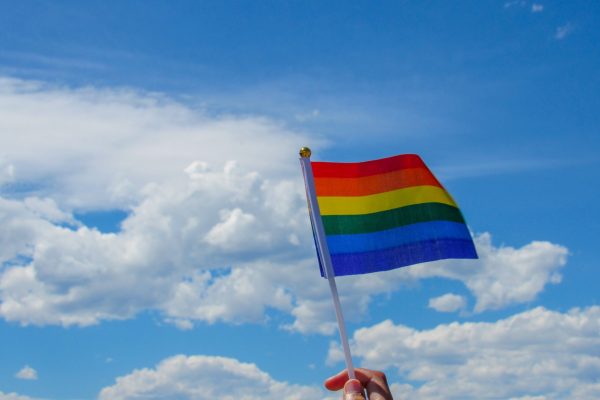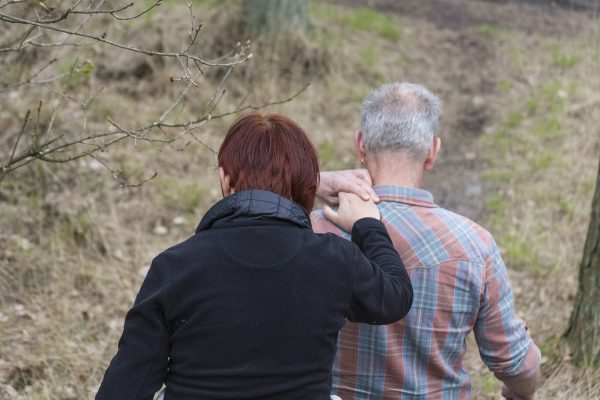What follows is a short excerpt from a much longer ceremony. Please contact us if you are interested in receiving the full ceremony by mail.
The community sings together:
Nigun familiar to the community
Leader:
“As the Israelites sang at the sea, so should the Jewish community sing when anyone of us chooses to liberate him or herself from old enslavements.” (Rebecca Alpert)
Reader:
V’ha-aretz haitah tohu vavohu, v’choshekh al p’nei t’hom… (Breishit 1:2)
And the earth was without form and void; and darkness was on the face of the deep…
Reader:
Let us bring order into a disordered world.
Seder means “order.” Traditionally, we use the term to refer to the Passover meal that commemorates when the children of Israel were freed from bondage in Mitzrayim—“the narrow place.” Seder reminds us that there are many rituals to be followed, many prayers and blessings to be recited, stories to be told, and songs to be sung, before the Passover is complete. During Pesakh, we follow the “order” of the service in the haggadah which leads us through slavery, to freedom, and urges us to dream beyond—to the final redemption and perfection of the world. Tonight, we also conduct a seder commemorating the “coming-out” of another narrow place—the closet of gay, lesbian, bisexual and transgender secrecy and shame that is often so necessary in a world that lacks understanding and courage. Our seder is a defiant act: order and freedom in the face of disorder and injustice.
Reader:
Tonight we gather for a coming-out seder. Some of us are here tonight, because, recently, we have come to recognize something new about who we are and about whom we love. Like our people’s exodus from the shackles of Mitzrayim, rendering us a free people, we have made an exodus from the shame and fear of the “closet.” We have nothing to hide as we move toward a land of greater promise. This world is still so far from full acceptance and support of gay, bisexual, lesbian, and transgender people, but we look to the warm faces around this seder table as a vision of a future world in which everyone can be safe and free.
Reader:
Some of us are here tonight, because we want to envision a world of justice for all people, regardless of race, age, class, ability, gender, or sexual orientation. We are here because we are part of a family, community, or society in which so many are still not free from the “Mitzrayims“ of our world. We are here tonight to say that we want to be part of that vision, and we want to help make that vision a reality. We want those amongst us who mark their “coming out” tonight to know that we affirm their honesty and bravery, and we accept the honor they bestow upon us by sharing this moment of transition with us.
Sh’ma Koleinu, Hear our voice, O God!
The community reads responsively:
Our people have always sent our pleas heavenward, beseeching the Holy One to hear our prayers of longing, hope, thanksgiving, and praise.
But what do we tell our children who do not know their own voices?
We tell them to sing from their hearts.
We tell them to find the holy prayers within.
But what of the child who knows not how to sing?
What of the child whose prayers do not yet have words in this world?
We are all these children
We are a community.
What of the child whose melody ambles outside the sanctuary and hovers, looking on the service from afar?
What of the child whose voice speaks in the syntax of a different world?
We are all these children
We are a community when we can all beseech, Sh’ma Koleinu.
We are a community of voices, when each of us can speak the truths of our hearts.
Wine – Our Symbol of Joy
The community reads responsively:
Our people’s tale is one of freedom, revelation, and the hope and work for final redemption, when all the world will be whole.
But the final redemption is still but a dream.
Tonight’s story begins with the first moments of freedom. God promised:
V’hotzeiti etkhem mitachat sivlot Mitzrayim (Shemot 6:6)
And I will free you from the burdens of Mitzrayim.
Tonight we drink four cups of wine to mark our redemption from the slavery of the closet. With each cup we move from the narrow strictures of hiding places to our vision of a better world.
Tonight, as a community, we courageously cross the sea of silence. We affirm the truths of the gay, lesbian, bisexual, and transgender members in our midst who bravely come out to us and to themselves. God in Her mysterious guises, God through the hands of this supportive gathering, fulfills the promise tonight to free us all from the burden of our narrowness.
We thus invoke the promise of the first cup and recite together:
Raising the cup of wine:
N’varekh et ein ha-chayim, matzmichat p’ri ha-gefen.
Let us bless the source of life that ripens fruit on the vine.
(Everyone drinks from the first cup)
These are our stories
At this point in the ceremony, participants may choose to share their own stories, readings, or divrei Torah explicating the meanings of coming out for each of them. The group may choose to reserve this honor specifically for participants who are coming out during this ritual. As those who come out tell their stories, they may choose to recite the following, recognizing this moment of transition in their lives and in the life of the whole community:
The community reads responsively:
We are a people descended from fiery prophets.
We hear their cry for justice.
Our mothers nursed their faith in the God of many facets.
Our mothers met each day anew in Her eyes.
Our fathers bent their hearts to new wisdoms.
Our fathers felt a changing world howl its greatness in their bosom.
We are children of joy and visions.
We ever renew the world toward wholeness.
We are young and old, rich and poor.
We are lesbian, gay, straight and bisexual.
We are men and women.
We are transgender.
We are wise and untutored.
We are creative and present in our bodies.
Let us, all of us together, cradle Torah in our hearts.
Let us learn to walk its paths toward a better world.
A world only envisioned,
a world in which all are free,
all act on mercy,
and all is just.
Leader blesses those coming out:
Transliteration:
Mi Shebeirakh imoteinu Sarah, Rivka, Leah v’Rachel, Bilhah v’ Zilpah, Miryam v’Rut, v’avoteinu, Avraham, Yitzchak, v’Ya’acov, Moshe, Aharon v’David, Hi t’varech et
______ bat __________she-ba’ah l’faneinu b’ometz lev l’hachriz al ha-z’khut ha-lesbit shelah
_______ ben __________ she-bah l’faneinu b’ometz lev l’hachriz al ha-z’hut ha-homosexualit shelo
_______ bat __________ she-ba’ah l’faneinu b’ometz lev l’hahcriz al ha-z’hut ha-bisexualit shelah
________ ben___________she-bah l’faneinu b’ometz lev l’hahcriz a ha-z’hut ha-bisexualit shelo
__________ bat __________ she-ba’ah l’faneinu b’ometz lev l’hachriz al ha-z’hut ha-transexualit shelah
_________ ben ___________ she-bah l’faneinu b’ometz lev l’hchriz al ha-z’hut ha-transexualit shelo
(Repeat appropriate line for each participant)
b’tokh ha-k’hillah ha-zot
For a man: Yigdal
For a woman: Tigdal
For group: Yigd’lu
B’havanah atzmit.
For a man: Yismach
For a woman: Tismach
For group: Yism’chu
Ba-zeihut he-chadash/ ba-z’huyot ha-chadashot
For a man: she-hu matzhir
For a woman: she-hi matzhirah
For group of men: she-hem matzhirim
For group of women: she-hen matzhirot
hayom. She-ne’emar: Vayizaku el-Adonai ba-tzar la-hem mimtzukoteihem yoshi’em. (Psalms 107:13) ha-g’vurah
For a man: shelo t’hiyeh
For a woman: shela t’hiyeh
For group of men: shelahem t’hiyeh
For group of women: shelahen t’hiyeh
L’dugmah u’l’mofeit l’chol yoshvei tevel she-mitgagayim l’sof hester panim b’tokh libeinu u’l’pidyon nafsheinu bimheirah b’yameinu.
For a man: Y’kabel
For a woman: T’kabel
For a group: Y’kablu
Ahavah, chamimut, u’t’mikhach m’ha-k’hillah ha-zot,
For a man: m’mishhpachto u’m’chaverav
For a woman: m’mishpachtah u’m’chavereiha
For group of men: m’mishpachteihem u’m’chavereihem
For a group of women: m’mishpachteihen u’m’chavereihen.
Ha-ma’aseh ha-zeh (Ha-ma’asim ha’eleh) latzeit min ha-metzarim y’orer / y’or’ru banu ruach chadashah. (Ezekiel 36:26) La’avod b’yeter s’eit likrat ha-yom, ha-yom k’she-anashim homosexualim, lesbiot, anashim v’nashim bisexualim, v’anashim v’nashim transexualim lo yisb’lu od m’sin’ah, midei’ot k’dumot u’minha-haflaya, ha-yom k’she-kol am Yisrael y’chiyu k’mo am echad, v’chol yoshvei tevel y’chiyu b’shalom u’b’shleimut. Amen.
English:
May the One who blessed our Mothers, Sarah, Rebecca, Leah and Rachel, Bilha and Zilpah, Miriam and Ruth, and our fathers, Abraham, Isaac and Jacob, Moses, Aaron and David, bless
____________ daughter of _____________ who comes before us with courage to declare her lesbian identity,
___________ son of _____________ who comes before us with courage to declare his gay identity,
________________ daughter of/son of ___________ who comes before us with courage to declare his/her bisexual identity,
_______________ daughter of/son of ____________ who comes before us with courage to declare his/her/hir/per transgender identity
(Repeat appropriate line for each participant)
in the midst of this community.
May he/she/they grow in self-understanding and may he/she/they rejoice in the new identity (identities) that he/she/they affirm(s) today. As it is written: “They cried to the Holy one from their narrow places, and God saved them from their distresses” (Psalms 107:13). May his/her/hir/per/their strength be a shining example to all who yearn for an end of the hiding of God’s face in our hearts and yearn for the redemption of our souls, soon, in our days. May he/she/they receive love, warmth, and support from this community, from his/her/their family (families), and from his/her/hir/per/their friends. May this act (these acts) of coming out inspire us to work more diligently toward the day when gay men, lesbians, bisexual people, and transgender people will not suffer from hatred, prejudice, and discrimination, when all of Israel will live as one people and all who dwell on earth will live in peace and wholeness. Amen.
Bayom ha-hu
Bayom ha-hu y’hiyeh Adonai echad u’shmo echad.
On that day, God shall be one and God’s name shall be one.
-or-
Gesher Tzar M’od
Kol ha-olam kulo, gesher tzar m’od.
V’ha-ikar, lo l’fached klal.
All the world is a narrow bridge.
And the essence of living is not to be afraid.











